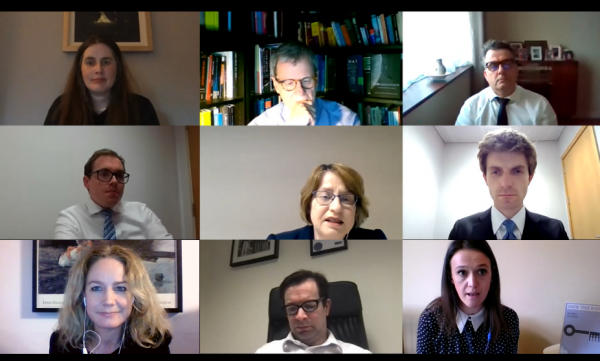Prison Law Seminar: The Prison Rules
25th February 2021

The Irish Penal Reform Trust and the Irish Criminal Bar Association hosted a seminar on The Prison Rules: Current Impact and Opportunities for Reform online on Thursday 25th February 2021, via Zoom.
The event was the first in IPRT’s 2021 Prison Law Seminar Series and examined the role of the Irish Prison Rules in vindicating prisoners’ rights, the process by which the Rules are amended and the opportunities for strengthening the protection they offer to prisoners. The event brought together legal practitioners, academics, administrators, and activists to discuss the Prison Rules and how they relate to the practice of prison law, the lived experience of prisoners and compliance with international best practice and human rights standards.
IPRT also launched an updated ‘Know Your Rights – Your Rights as a Prisoner’ guide at the seminar.
The seminar was chaired by Professor Mary Rogan, President of the International Penal and Penitentiary Foundation and Principal Investigator of the PRILA project.
SPEAKERS
FIRST HALF
Molly Joyce, Legal & Public Affairs Manager, Irish Penal Reform Trust
Molly took us through the background of new edition of the IPRT’s Know Your Rights guide, which is a comprehensive yet accessible guide to prisoners’ rights for prisoners and their families. She also spoke about the origins of the Prison Rules and their importance for setting out enforceable minimum standards. She also highlighted the importance of transparency and public scrutiny in the drafting and amending of the Prison Rules.
Damien Coffey, Senior Associate at Sheehan & Partners
Damien discussed how the restrictions placed on prisoners to prevent the transmission of COVID-19 have been extremely burdensome. He spoke about repeated quarantine sessions, the denial of access to showers and the withdrawal of structured activities and in-person visits as things that have made being incarcerated much more difficult and impacted the mental health and rehabilitation of many prisoners.
Matthew Kenny, Partner at O’Sullivan Kenny LLP and Honorary Treasurer of the Dublin Solicitors Bar Association
Matthew outlined the Prison Rules that govern correspondence and spoke about the frustration and upset caused by the significant delay prisoners experience receiving correspondence from family and friends. This is amplified by the lack of visits due to the pandemic and particularly impacts the parents of pre-teen children, especially around birthdays and Christmas. He said that the courts have upheld a prisoner’s right to correspond with people on the outside and this backlog needs to be addressed if that right is to be effectively vindicated.
David Perry BL, Barrister and Board Member of the Irish Penal Reform Trust
David spoke about the use of the Prison Rules to legally challenge the segregation of prisoners, the outcome of disciplinary processes and unsatisfactory conditions. He highlighted the challenges of using the Prison Rules in litigation because of their incomplete subject matter and the way they are drafted with many caveats, which give significant latitude to prison management.
SECOND HALF
SPEAKERS
Patricia Gilheaney, Chief Inspector at the Office of the Inspector of Prisons
The Chief Inspector said that international best practice and transparency requires the independent inspection of prisons. She welcomed the strengthening of Part 6 of the European Prison Rules which state that no prisoner or prison worker shall be punished for providing information to monitors. She announced that the Office of the Inspectors of Prisons will conduct a thematic inspection of all Irish prisons that will be alert to the impact of the COVID-19 pandemic on prisoners’ rights and welfare.
John Farrelly, Chief Executive of the Mental Health Commission
John spoke about the role the Mental Health Commission (MHC) plays in providing evidence-based and human rights focused advocacy for good practices in the mental healthcare field and the protection of the interests of patients who have been involuntarily committed to institutions. John indicated that the MHC are commencing a public consultation on the revision of rules next year, to ensure they are absolutely fair and vindicate people's right.
Professor Dirk van Zyl Smit, Emeritus Professor of Comparative and International Penal Law at the University of Nottingham; Expert Adviser to the Council of Europe on the European Prison Rules and the European Rules on Juvenile Offenders
Dirk discussed the European Prison Rules. His formidable academic knowledge was bolstered by the role he played drafting the European Rules, and he provided a fascinating account of their development and their response to evolving human rights standards.
IPRT's Legal & Public Affairs Programme is supported through a donor-advised fund of the Community Foundation for Ireland.





